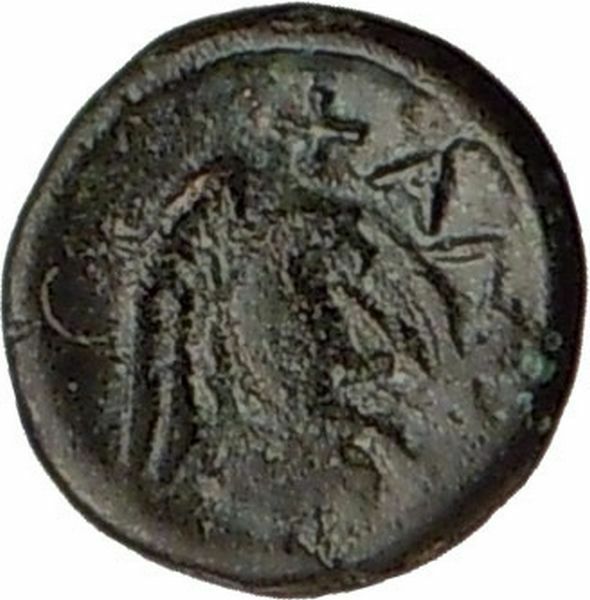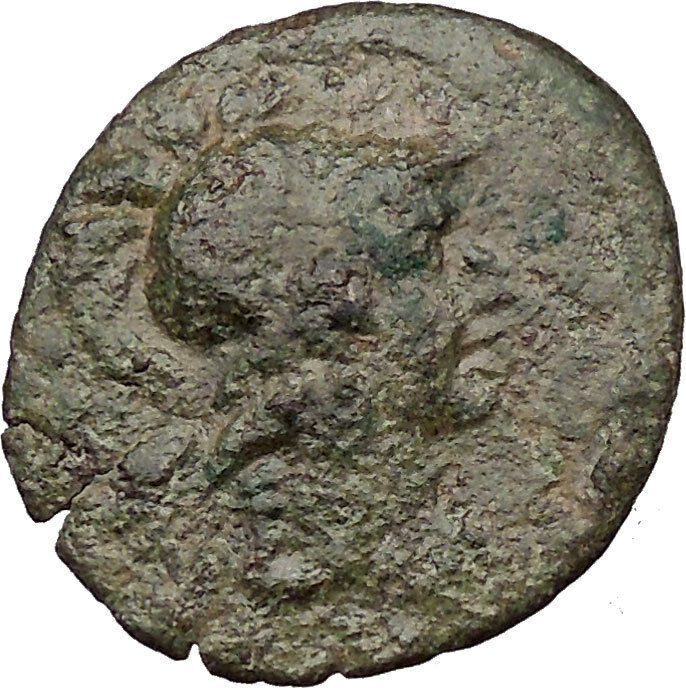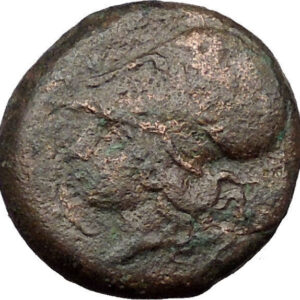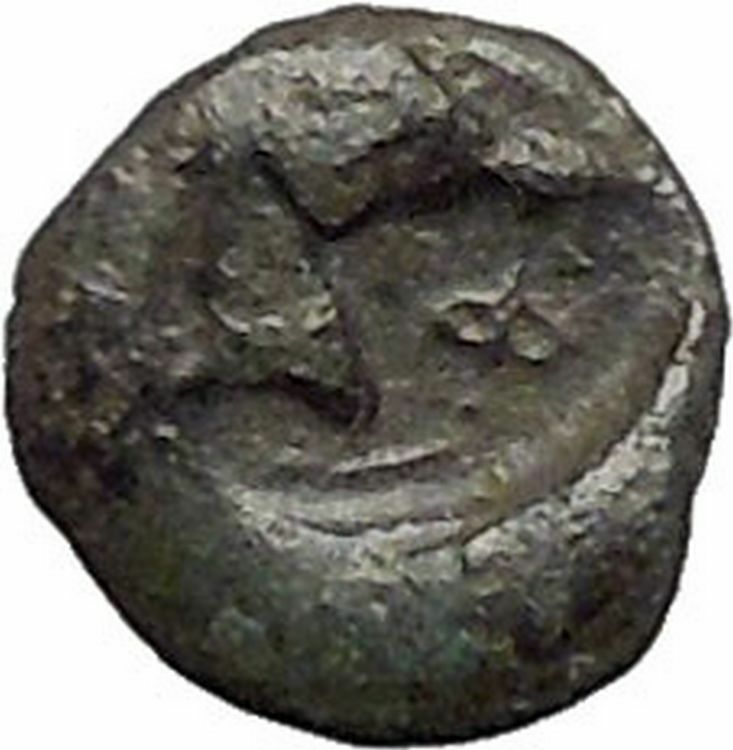|
Greek city of Larissa under Thessalian League
Bronze 20mm (6.39 grams) Struck in the Thessalian League City of Larissa
circa 196-146 B.C.
Reference: Sear 2237; B.M.C. 7.50,51
Laureate head of Apollo right.
ΘΕΣΣΑ / ΛΩΝ – behind and before Athena Itonia advancing right, brandishing spear
and holding shield; monogram in field to right.
Following the great victory of the Roman general Flamininus
over Philip V of Macedon, in 197 B.C., the freedom of the Greeks was proclaimed
at Corinth and a number of new autonomous coinages were initiated. Those in the
name of the Thessali were struck probably at Larissa. The Thessalian League
was a loose confederacy of feudal-like city-states and tribes in the Thessalian
valley in Northern Greece
and was run by a few aristocratic Thessalian families (Aleuadae
and Skopadae). The seat of the Thessalian diet was
Larissa
.
You are bidding on the exact item pictured,
provided with a Certificate of Authenticity and Lifetime Guarantee of
Authenticity.

In
Greek
and
Roman mythology
, Apollo
,
is one of the most important and diverse of the
Olympian deities
. The ideal of the
kouros
(a
beardless youth), Apollo has been variously recognized as a god of light and the
sun; truth and prophecy;
archery
;
medicine and healing; music, poetry, and the arts; and more. Apollo is the son
of Zeus
and
Leto, and has a
twin
sister, the chaste huntress
Artemis
.
Apollo is known in Greek-influenced
Etruscan mythology
as Apulu. Apollo was worshiped in both
ancient Greek
and
Roman religion
, as well as in the modern
Greco
–Roman
Neopaganism
.
As the patron of Delphi
(Pythian Apollo), Apollo was an
oracular
god — the prophetic deity of the
Delphic Oracle
.
Medicine and healing were associated with Apollo, whether through the god
himself or mediated through his son
Asclepius
,
yet Apollo was also seen as a god who could bring ill-health and deadly
plague
as well as one who had the ability to cure. Amongst the god’s
custodial charges, Apollo became associated with dominion over
colonists
, and as the patron defender of herds and flocks. As the leader of
the Muses
(Apollon
Musagetes) and director of their choir, Apollo functioned as the patron god
of music and poetry
.
Hermes
created
the lyre
for him,
and the instrument became a common
attribute
of Apollo. Hymns sung to Apollo were called
paeans
.
In Hellenistic times, especially during the third century BCE, as Apollo
Helios he became identified among Greeks with
Helios
,
god of
the sun
, and his sister Artemis similarly equated with
Selene
,
goddess
of the moon
.
In Latin texts, on the other hand, Joseph Fontenrose declared himself unable to
find any conflation of Apollo with
Sol
among the
Augustan poets
of the first century, not even in the conjurations of
Aeneas
and
Latinus
in
Aeneid
XII
(161–215).
Apollo and Helios/Sol remained separate beings in literary and mythological
texts until the third century CE.
Larissa, sometimes written Larisa on
ancient coins and inscriptions, is near the site of the
Homeric Argissa. It appears in early times, when
Thessaly
was mainly governed by a few aristocratic
families, as an important city under the rule of the
Aleuadae
, whose authority extended over the whole
district of
Pelasgiotis
. This powerful family possessed for many
generations before 369 BC the privilege of furnishing
the tagus, the local term for the
strategos
of the combined Thessalian forces. The
principal rivals of the Aleuadae were the
Scopadac
of
Crannon
, the remains of which (called by the Turks
Old Larissa) are about 14 miles south west. The
inhabitants sided with
Athens
during the Peloponnesian War.
As the chief city of ancient
Thessaly, Larissa was directly annexed by Philip II of
Macedon in 344, and from then on Larissa was under
Macedonian control; in 196 B.C. Larissa became an ally
of Rome and was the headquarters of the
Thessalian League
.
Thessaly was home to an extensive
Neolithic
culture around
2500 BC
.
Mycenaean
settlements have also been discovered, for example at the sites of
Iolcos
,
Dimini
and
Sesklo
(near
Volos
). Later, in
ancient Greek
times, the lowlands of Thessaly became the home of baronial
families, such as the
Aleuadae
of
Larissa
or
the Scopads of Crannon. These baronial families organized a federation across
the Thessaly region, later went on to control the
Amphictyonic League
in northern Greece. The
Thessalians
were renowned for their cavalry.
In the summer of
480 BC
, the
Persians invaded Thessaly. The Greek army that guarded the
Vale
of Tempe
, evacuated the road before the enemy arrived. Not much later,
Thessaly surrendered. The Thessalian family of
Aleuadae
joined the Persians. In the
Peloponnesian War
the Thessalians tended to side with Athens and usually
prevented Spartan troops from crossing through their territory with the
exception of the army of Brasidas.
Jason of Pherae
briefly transformed the country into a significant military
power, though he was assassinated before any lasting achievements were made. In
the 4th century BC
Thessaly became dependent on
Macedon
and many served as vassals. In
148 BC
the
Romans formally incorporated Thessaly into the province of
Macedonia
, though in 300 AD Thessaly was made a separate province with its
capital at Larissa
.
It was part of the Byzantine Empire and suffered many
invasions. In 977 it was occupied by the Bulgarians, who remained there until
1014. In 1204 he was assigned to
Boniface of Montferrat
and in 1225 to
Theodore Komnenos Doukas
, despot of
Epirus
. From
1271 to 1318 he was an independent despotate that extended to
Acarnania
and Aetolia
,
run by John III Angelos Komneno. In 1309 settled there the
Almogavars
or
Catalan Company
of the East (Societas Catalanorum Magna), which in 1310,
after lifting the siege of Thessalonica, withdrew as mercenaries in the pay of
the sebastocrátor
John II, and took over the country organized in a democracy.
From there went to the
Duchy of Athens
called by the duke Walter I. In 1318, with the extinction of
the dynasty of Angelos, the Almogavars occupied Siderocastron and southern
Thessaly (1319) and formed the
duchy of Neopatria
.
Later it was occupied by the
Serbs
until 1393,
after being dominated by the
Ottomans
. In 1821 participated in the
Greek War of Independence
, but was not recognized as part of
Greece
until
1881.
|









